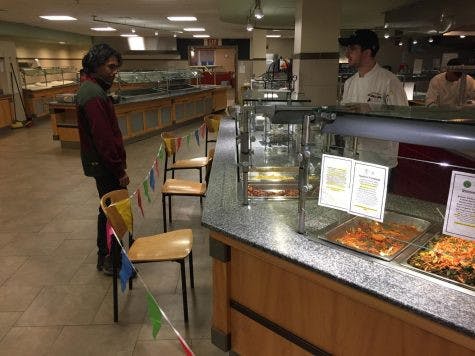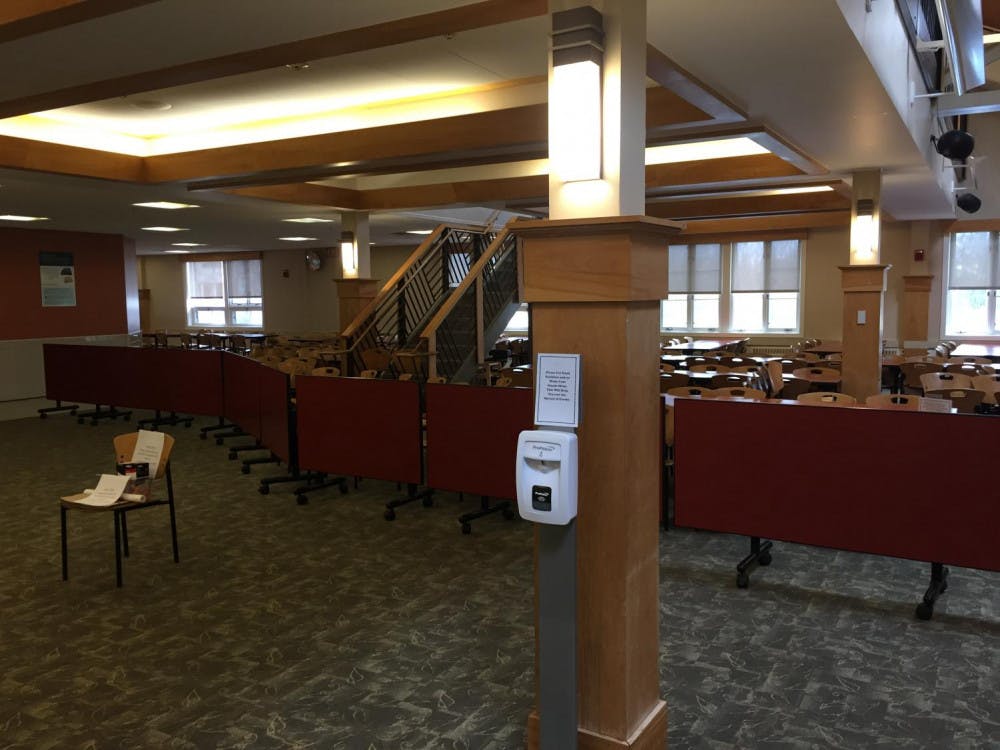Update: Since this article was published, Dean of Students Baishakhi Taylor told The Campus that students remaining on campus will be allowed to stay until the end of the semester, as long as federal and state governments do not change their policies. See that update in full here.
For the approximately 120 students who have remained at Middlebury since in-person classes were discontinued on March 13, campus life is far from what it was just a few weeks ago. As the threat of Covid-19 continues to rise, the college has implemented a series of changes geared towards social distancing and outbreak preparedness. Students are still waiting to hear whether they will be allowed to stay on campus for the remainder of the semester or asked to go home.
Nearly all campus buildings, including libraries, Atwater and Ross dining halls, and most residence halls, are closed to the remaining students. Students received an email on Wednesday, March 18 that asked them to relocate to Gifford, Hepburn, and Forest Halls by Saturday, March 21.
Last weekend, Meili Huang ’23 packed up her Battell double and moved into a single in Hepburn. Huang said the move-out process was similar to that which many students who left campus experienced the week prior.
“They offered the boxes and everything and there was a sign up sheet for asking for people to help, and they will help you move everything,” she said.
Xuan He ’20, recounted a similar experience. She said college facilities staff drove students and their boxes between their old and new rooms.
“I was really moved to see so many people working together to make sure that students on campus still have a place to stay,” she said.
Although the school consolidated students into three residence halls, they strategically assigned rooms in a manner that promotes social distancing. Individual halls within the dorms are at half occupancy at most, and all students are living alone.
“The halls are pretty empty, quiet, and it's just kind of weird,” Huang said.
No more than two students share a single bathroom and some students have a bathroom to themselves. Custodial staff are working even harder to ensure spaces are clean — He said it seems they are now cleaning the bathrooms daily.
Francoise Niyigena ’21, a First Year Counselor who lived in Hadley, said that a piece of paper on the doors of students’ former rooms stated they were approved to stay on campus until the end of spring break. The school has not yet confirmed whether students can live on campus beyond April 5, but some are taking their relocation as a sign that they will be permitted to stay until the end of the semester. Niyigena’s Commons Residence Director said the rooming situation could potentially change depending on Center for Disease Control (CDC) guidelines.
The email students received regarding dormitory relocation said that moving would make things easier on staff and that the school had a responsibility to the greater Middlebury community. Niyigena said she thinks this means empty dorms could be repurposed to increase Porter Hospital’s capacity need be. He, who previously lived in the Interfaith House, said her former residence is being converted into a potential quarantine space.
Vermont Governor Phil Scott issued a statewide stay-at-home order on March 24, asking residents to cease nonessential travel. Niyigena said that students essentially already adhered to such standards prior to the actual order. Students are not permitted to leave the town of Middlebury, and many businesses have closed. Middlebury’s grocery stores are open, but news of a local Shaw’s employee who tested positive for Covid-19 has spread concern among students.

To limit how many people touch food and serving utensils, students can no longer serve themselves. Staff members place each student’s meal into a to-go box for them.
At Proctor, the only dining hall that has remained open, staff members serve food in disposable to-go boxes, and students can no longer eat in the dining rooms.
“For the last couple of days, the dining hall tables have been removed,” said Niyigena. “There's like a chair wall between us and the staff that are serving us.”
Despite these changes, students still have many food options available to them. He said there are usually four or five hot food options as well as some salad bar items, milks and a few different desserts. In order to limit how many people touch food and serving utensils, students can no longer serve themselves. Staff members place each student’s meal into a to-go box for them.
“The positive thing about this experience is that now students actually have more interactions — direct interactions — with dining hall staff,” He said. “We say ‘thank you’ and ‘hello’ and they ask us what we would like to have.”
Though nearly all campus spaces are now closed to students, MiddExpress and the Grille have remained open with limited hours. Even so, the school discouraged gatherings of more than ten people in an email to on-campus students. The Mail Center is also currently open, but is scheduled to close after April 5. Cater Wang ’21 said that students have been practicing social distancing by standing further from the Mail Center window, and staff now sign for picked-up packages instead of students.
“I guess the major difference is just you have less people waiting in line for a package,” he said.
In the absence of typical on-campus activities and hang-out spaces — and with coronavirus precautions minimizing face-to-face interaction — students are finding different ways to fill their time and see one another.
“For me, I go take walks and try to keep my room sanitized and meditate,” He said. “I meditate quite often or try to do yoga, and sometimes my friends and I do workout sessions outside together.”
Huang said she has spent a lot of time in her room doing work and watching TV shows, but she sometimes asks friends if they want to pick up lunch and eat it together. Niyigena has also appreciated small-scale group activities such as evening yoga sessions planned by one of her friends.
“Or you do a movie night or have tea or cook together with just like three, four other people, just to kind of have that sense of community,” she said. “I think that's been really, really helpful for me.”
While small get-togethers provide a degree of normalcy, students noted how much emptier the campus feels.
“I've gone for a couple walks, maybe for like a run around, and you barely see anybody,” said Niyigena. “Or maybe you see like two or three other people, but that's it.”

Abigail Chang ’23 (she/her) is the Editor in Chief.
She previously served as a managing editor, Senior News Editor, News Editor and co-host of The Campus' weekly news radio show.
Chang is majoring in English and minoring in linguistics. She is a member of the Media Portrayals of Minorities Project, a Middlebury lab that uses computer-assisted and human coding techniques to analyze bulk newspaper data.
Throughout last year, Chang worked on source diversity and content audits for different media properties as an intern for Impact Architects LLC. Chang spent summer 2021 in Vermont, working as a general assignment reporter for statewide digital newspaper VTDigger. Chang is also a member of the Middlebury Paradiddles, an a cappella group.




